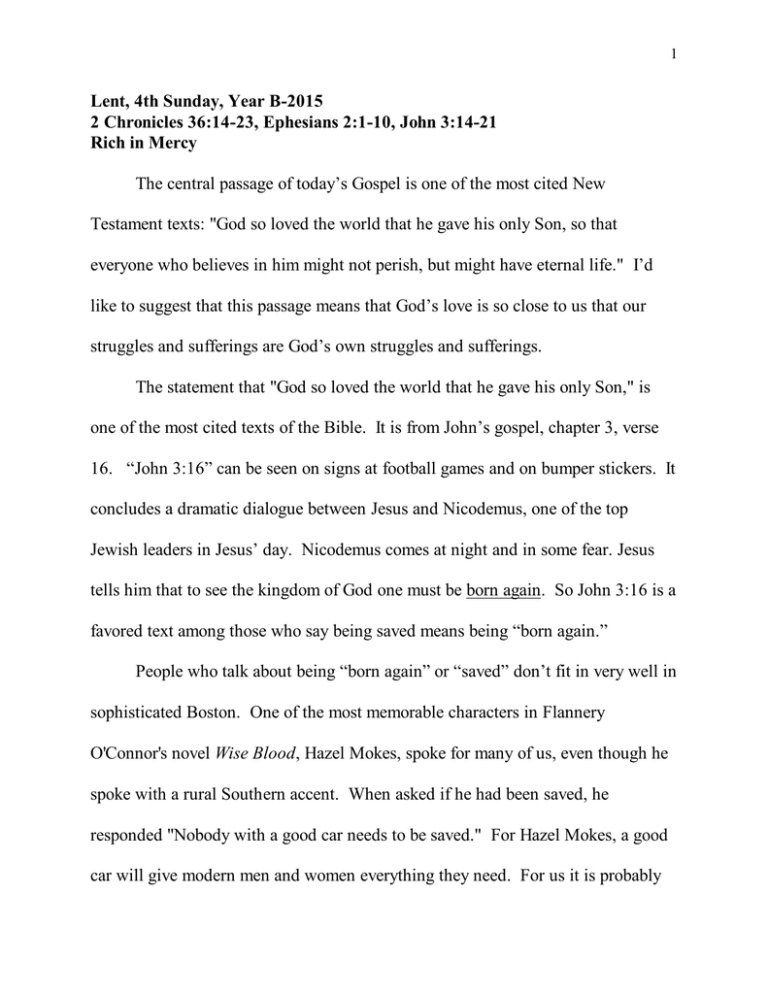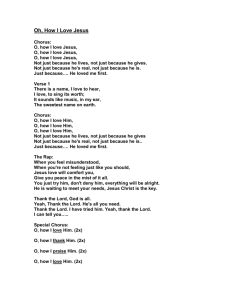Lent, 4th Sunday, Year B-2015 Rich in Mercy
advertisement

1 Lent, 4th Sunday, Year B-2015 2 Chronicles 36:14-23, Ephesians 2:1-10, John 3:14-21 Rich in Mercy The central passage of today’s Gospel is one of the most cited New Testament texts: "God so loved the world that he gave his only Son, so that everyone who believes in him might not perish, but might have eternal life." I’d like to suggest that this passage means that God’s love is so close to us that our struggles and sufferings are God’s own struggles and sufferings. The statement that "God so loved the world that he gave his only Son," is one of the most cited texts of the Bible. It is from John’s gospel, chapter 3, verse 16. “John 3:16” can be seen on signs at football games and on bumper stickers. It concludes a dramatic dialogue between Jesus and Nicodemus, one of the top Jewish leaders in Jesus’ day. Nicodemus comes at night and in some fear. Jesus tells him that to see the kingdom of God one must be born again. So John 3:16 is a favored text among those who say being saved means being “born again.” People who talk about being “born again” or “saved” don’t fit in very well in sophisticated Boston. One of the most memorable characters in Flannery O'Connor's novel Wise Blood, Hazel Mokes, spoke for many of us, even though he spoke with a rural Southern accent. When asked if he had been saved, he responded "Nobody with a good car needs to be saved." For Hazel Mokes, a good car will give modern men and women everything they need. For us it is probably 2 symbolized differently--a good degree, a successful career, children who get into the right schools--anybody who has these things doesn't need salvation. But Flannery O'Connor tells us that Hazel Mokes was not able to live as the sophisticate he desperately wanted to be. Despite Mokes' desire to found the new church without salvation, the idea that “God so loved the world that he gave his only Son” lurked in his mind like a monkey swinging from tree to tree in the darkest part of the forest. I think that might be true for us also. Despite the real value of degrees, careers, and success, we know that they are not enough. We know this when health problems touch us, or touch those close to us. We know it when someone very dear to us dies. We know it when we read of effects of war in Syria and of poverty in Africa. We know it most personally when we realize that each of us—you and me both—will face death. In the face of these realities, Hazel Mokes’ good car is just not enough. So what do we need? John 3:16 tells us that no matter what our struggles, God so loves us that God will give us what we most deeply need. Indeed, God is with us when we are in need, when those dear to us suffer, or when children face war in Syria or poverty in Africa. God is with us when we face death. God is with us in love, a love that promises life. For on Calvary with Jesus, God has already been wherever there is suffering. Jesus’s death on Calvary means that God does not give us the fullness of life only after we get our act together or when injustice 3 and war have been eliminated. Rather the cross of Jesus tells us that God enters into the very depths of the suffering of our world and embraces it. As St. Paul put it in the second reading: "God is rich in mercy.” God is merciful. Mercy--in Latin, miseri-cordia—literally means to have a heart full of misery. In Christ, a merciful God takes the miseries of the world into God's own heart. God’s compassion embraces us in all our struggles, doubts, and incompleteness. In Christ, God embraces every victim of injustice, disease, or violence--and everyone who has ever harmed another also. I think this is what John means when he tells us that “God so loved the world that he gave his only Son.” On Jesus’s cross, God entered fully into the reality of human struggle and suffering. The cross means that where you or I struggle or suffer, God can say to us “we struggle, we suffer.” The cross tells us that wherever there is hurt, God has been there. God is there in Christ, embracing, healing, loving. God is there saving, offering the fullness of life even in the face of death. "God so loved the world that he gave his only Son, so that everyone who believes in him might not perish, but might have eternal life." It is no wonder that Hazel Mokes couldn’t get the idea of salvation out of the back corners of his mind. And, I suspect, neither can we. Let us thank God together at the table of the Lord for this great gift of God’s merciful love. David Hollenbach, S.J. St. Ignatius Church March 15, 2015









